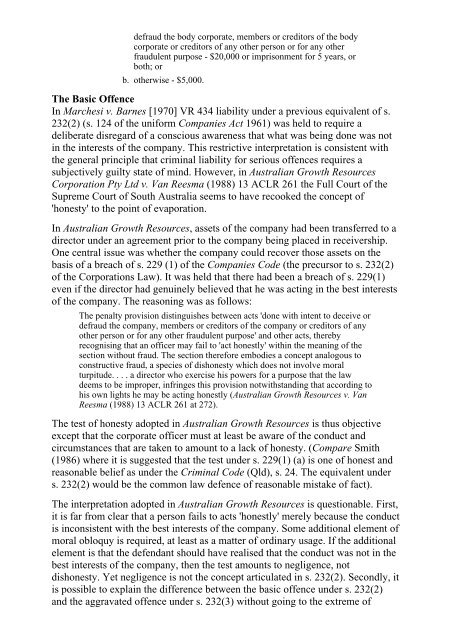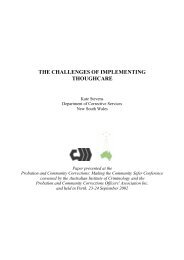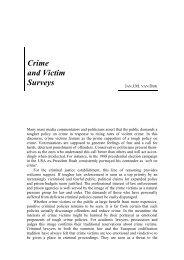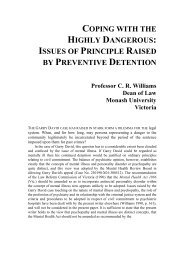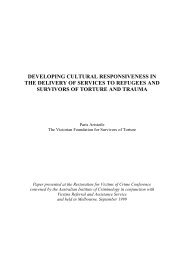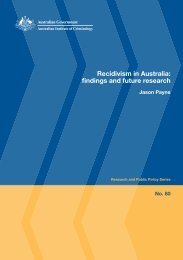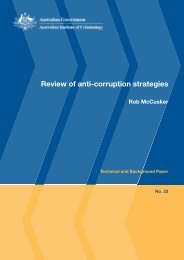Fraud and the liability of company directors - Australian Institute of ...
Fraud and the liability of company directors - Australian Institute of ...
Fraud and the liability of company directors - Australian Institute of ...
Create successful ePaper yourself
Turn your PDF publications into a flip-book with our unique Google optimized e-Paper software.
.<br />
defraud <strong>the</strong> body corporate, members or creditors <strong>of</strong> <strong>the</strong> body<br />
corporate or creditors <strong>of</strong> any o<strong>the</strong>r person or for any o<strong>the</strong>r<br />
fraudulent purpose - $20,000 or imprisonment for 5 years, or<br />
both; or<br />
o<strong>the</strong>rwise - $5,000.<br />
The Basic Offence<br />
In Marchesi v. Barnes [1970] VR 434 <strong>liability</strong> under a previous equivalent <strong>of</strong> s.<br />
232(2) (s. 124 <strong>of</strong> <strong>the</strong> uniform Companies Act 1961) was held to require a<br />
deliberate disregard <strong>of</strong> a conscious awareness that what was being done was not<br />
in <strong>the</strong> interests <strong>of</strong> <strong>the</strong> <strong>company</strong>. This restrictive interpretation is consistent with<br />
<strong>the</strong> general principle that criminal <strong>liability</strong> for serious <strong>of</strong>fences requires a<br />
subjectively guilty state <strong>of</strong> mind. However, in <strong>Australian</strong> Growth Resources<br />
Corporation Pty Ltd v. Van Reesma (1988) 13 ACLR 261 <strong>the</strong> Full Court <strong>of</strong> <strong>the</strong><br />
Supreme Court <strong>of</strong> South Australia seems to have recooked <strong>the</strong> concept <strong>of</strong><br />
'honesty' to <strong>the</strong> point <strong>of</strong> evaporation.<br />
In <strong>Australian</strong> Growth Resources, assets <strong>of</strong> <strong>the</strong> <strong>company</strong> had been transferred to a<br />
director under an agreement prior to <strong>the</strong> <strong>company</strong> being placed in receivership.<br />
One central issue was whe<strong>the</strong>r <strong>the</strong> <strong>company</strong> could recover those assets on <strong>the</strong><br />
basis <strong>of</strong> a breach <strong>of</strong> s. 229 (1) <strong>of</strong> <strong>the</strong> Companies Code (<strong>the</strong> precursor to s. 232(2)<br />
<strong>of</strong> <strong>the</strong> Corporations Law). It was held that <strong>the</strong>re had been a breach <strong>of</strong> s. 229(1)<br />
even if <strong>the</strong> director had genuinely believed that he was acting in <strong>the</strong> best interests<br />
<strong>of</strong> <strong>the</strong> <strong>company</strong>. The reasoning was as follows:<br />
The penalty provision distinguishes between acts 'done with intent to deceive or<br />
defraud <strong>the</strong> <strong>company</strong>, members or creditors <strong>of</strong> <strong>the</strong> <strong>company</strong> or creditors <strong>of</strong> any<br />
o<strong>the</strong>r person or for any o<strong>the</strong>r fraudulent purpose' <strong>and</strong> o<strong>the</strong>r acts, <strong>the</strong>reby<br />
recognising that an <strong>of</strong>ficer may fail to 'act honestly' within <strong>the</strong> meaning <strong>of</strong> <strong>the</strong><br />
section without fraud. The section <strong>the</strong>refore embodies a concept analogous to<br />
constructive fraud, a species <strong>of</strong> dishonesty which does not involve moral<br />
turpitude. . . . a director who exercise his powers for a purpose that <strong>the</strong> law<br />
deems to be improper, infringes this provision notwithst<strong>and</strong>ing that according to<br />
his own lights he may be acting honestly (<strong>Australian</strong> Growth Resources v. Van<br />
Reesma (1988) 13 ACLR 261 at 272).<br />
The test <strong>of</strong> honesty adopted in <strong>Australian</strong> Growth Resources is thus objective<br />
except that <strong>the</strong> corporate <strong>of</strong>ficer must at least be aware <strong>of</strong> <strong>the</strong> conduct <strong>and</strong><br />
circumstances that are taken to amount to a lack <strong>of</strong> honesty. (Compare Smith<br />
(1986) where it is suggested that <strong>the</strong> test under s. 229(1) (a) is one <strong>of</strong> honest <strong>and</strong><br />
reasonable belief as under <strong>the</strong> Criminal Code (Qld), s. 24. The equivalent under<br />
s. 232(2) would be <strong>the</strong> common law defence <strong>of</strong> reasonable mistake <strong>of</strong> fact).<br />
The interpretation adopted in <strong>Australian</strong> Growth Resources is questionable. First,<br />
it is far from clear that a person fails to acts 'honestly' merely because <strong>the</strong> conduct<br />
is inconsistent with <strong>the</strong> best interests <strong>of</strong> <strong>the</strong> <strong>company</strong>. Some additional element <strong>of</strong><br />
moral obloquy is required, at least as a matter <strong>of</strong> ordinary usage. If <strong>the</strong> additional<br />
element is that <strong>the</strong> defendant should have realised that <strong>the</strong> conduct was not in <strong>the</strong><br />
best interests <strong>of</strong> <strong>the</strong> <strong>company</strong>, <strong>the</strong>n <strong>the</strong> test amounts to negligence, not<br />
dishonesty. Yet negligence is not <strong>the</strong> concept articulated in s. 232(2). Secondly, it<br />
is possible to explain <strong>the</strong> difference between <strong>the</strong> basic <strong>of</strong>fence under s. 232(2)<br />
<strong>and</strong> <strong>the</strong> aggravated <strong>of</strong>fence under s. 232(3) without going to <strong>the</strong> extreme <strong>of</strong>


